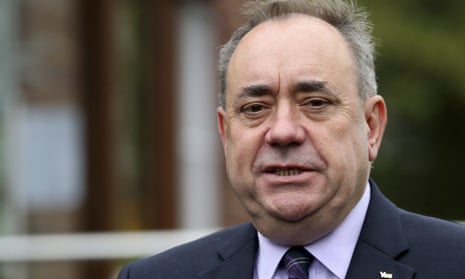Women’s rights campaigners have warned that Alex Salmond’s crowdfunding appeal could discourage alleged victims of sexual assault from coming forward.
Rape Crisis Scotland and Scottish Women’s Aid said the former first minister’s use of his fame and power to raise £100,000 for his legal expenses risked making it even harder for women to come forward.
Sandy Brindley, the chief executive of Rape Crisis Scotland, said Salmond’s actions would have a chilling effect on rape complainants.
“People wonder why women don’t report sexual harassment, but events of the past few days show exactly why women might be reluctant to report,” she said.
“Women worry about not being believed or about having their credibility attacked. This is particularly the case when the person they are accusing is in a powerful or prominent position.”
Salmond said the money raised will be used solely to fund the costs of his judicial review, concerning the Scottish government’s handling of complaints of sexual harassment against him by two female civil servants while he was first minister. He denies harassment.
He argued the complaints process breached his rights to confidentiality and due process. He said this undermined the fairness of the process for his accusers, a claimrejected by the Scottish government and his successor, Nicola Sturgeon.
Salmond has taken legal action after being told he was to be named last month by the Scottish government. The two women have not been identified, in line with the longstanding legal rights of rape and sexual assault claimants to anonymity.
Many of the 4,100 supporters who funded his appeal have criticised the complainants online, claiming they acted out of malicious intent, as part of a dirty tricks operation by the British state, and they ought to be “exposed”.
That has been echoed on Twitter and other social media sites, with some SNP parliamentarians retweeting those claims. Police Scotland is considering whether to launch a criminal investigation into the complaints.
Marsha Scott of Scottish Women’s Aid said she echoed Brindley’s concerns, saying Salmond’s crowdfunding risked rolling back recent gains by the #MeToo movement, which had greatly lessened a culture of tolerance towards sexual misconduct in the workplace.
“The very anxieties and fears that hold survivors back from speaking out – of not being believed, of having their character and motives questioned – have been played out in public for all to see,” she said.
A spokesman for Salmond repeated his argument that it was the original leak of the investigation against him that undermined confidence in the process.
“What might deter future complainants from coming forward and shake confidence in the right to make a complaint is breach of confidentiality, such as the planted leaks which have occurred in this case,” the spokesman told the Scottish edition of the Mail on Sunday.
Sturgeon has underlined the stance taken by Rape Crisis Scotland and Scottish Women’s Aid, despite growing signs the controversy is splitting her party.
“I want to be not just the first minister, but also a citizen of a country where people feel that they can come forward and know that their complaints will be taken seriously,” she said on Friday.
“Therefore, in everything we do and say, we need to make sure that we are not making it harder for people to come forward in the future. Otherwise, we risk setting back so much of the progress that has been made in recent times.”
